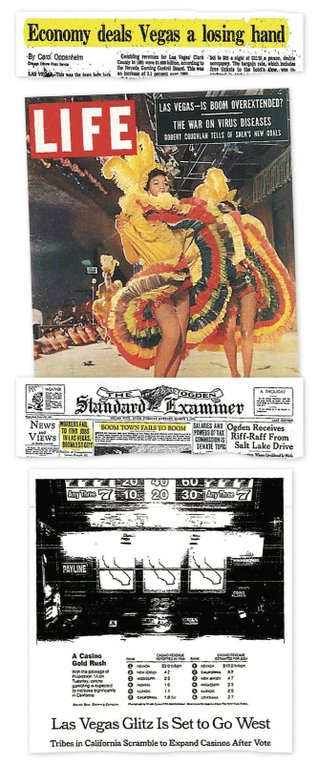
CLIPS COURTESY OF APPLIED ANALYSIS; COLLAGE BY LAS VEGAS SUN
From top: Chicago Tribune, 1982; Life magazine, 1955; The Ogden Standard Examiner, 1931; The New York Times, 2000. All reported bad news about Las Vegas, but the city apparently was not paying attention.
Sunday, April 19, 2009 | 2 a.m.
National Spotlight

Viewing video requires the latest version of Adobe's Flash Player
Sun Archives
If you listen carefully, you can hear the clicking keyboard sound of Las Vegas’ obituary being written.
National media organizations in recent weeks have been exploring stories on the death of Las Vegas. A couple of top-shelf newspapers, a magazine or two and one of the networks have all been asking gloomy questions.
For Las Vegas, however, this is actually wonderful news. If the history of Las Vegas shows anything, it is that when the nation’s media sound the death knell for this city, good times are on the way. It’s been happening as far back as the 1940s and ’50s.
Each obituary became a birth notice.
“Just like when your cabdrivers are giving you stock market tips, you know the market is on the way down, when you see the national media pronouncing the end of a historically vital city, it’s a good time to bet on it,” gaming analyst Bill Lerner said.
Putting his money where his mouth is, Lerner left Deutsch Bank last week to launch his own Las Vegas-based gaming analysis firm.
He’s betting Las Vegas is going to come back and he sees all the bad press as a sign to buy in now.
(Admittedly, Lerner is also the guy who, in January of 2008, thought Las Vegas Sands stock would rise to $120 a share — it currently trades for just over $5.)
And if the national media are not working on a Death of Vegas story, maybe they should be.
Nevada is facing a budget shortfall of $2.8 billion, the stratospheric home foreclosure rate just shot into the mesosphere, casino projects have been abandoned or put on hold, gaming companies are facing bankruptcy reorganization, the number of tourists coming here is off and they’re spending less than ever and so on. We’re all used to hearing it. Put it all together and our future sounds bleak as Death Valley in July.
Alan Feldman is MGM Mirage’s senior vice president of public affairs and one of the first people every national reporter calls. He says in recent weeks he’s heard from Time magazine, Vanity Fair, Nightline and The New York Times. He won’t disclose what stories they’re working on but says writers — not the usual cast of business reporters — have had lots of gloomy questions, because, quite frankly, the news out of Las Vegas is pretty gloomy right now.
But the pessimism of a doomsayer can be as off the mark as the optimism of, just to pick an example, someone advising in 2006 to buy real estate before you are forever priced out of the market, Feldman said.
“I’ve been here almost 20 years and this is not even remotely the first time this has happened,” Feldman said. “They would all like to write Las Vegas’ obituary.”
As if they haven’t tried in the past:
• “Both Las Vegas and Reno are ‘flops’ as Monte Carlos” — The New York Times, 1931
• “Snake Eyes in Las Vegas” — Time, 1955
• “Economy deals Vegas a losing hand” — Chicago Tribune, 1982
And yet, somehow, Las Vegas escaped the reaper’s scythe to become a metropolitan area of almost 2 million people.
So, in times of woe, it might help to look back on our past.
“Las Vegas was written off almost from the beginning. It was dismissed as this dusty little town,” said Mike Green, a history professor at the College of Southern Nevada.
In the 1920s, we were a railroad town. Then the rail yards and repair shops left town. We should have been doomed, but then the highway came through, Hoover Dam construction started, we legalized gambling and quickie divorces, and we were fine. Even during the Great Depression, we did better than most. Then, when the dam was finished, we were supposed to be finished, too. But we weren’t, because of the money World War II projects brought to us and our greatest feeder market, Southern California.
In the mid-’50s, we overbuilt and a couple of casinos had to close, but we bounced back by attracting new business travelers. In the ’70s and early ’80s, Atlantic City and a gloomy national economy were supposed to be our undoing. But in the ’90s, we thrived by re-attracting middle-income tourists, and for most of the last decade we thrived on wealthy travelers, people who could pay for gourmet meals and $300 bottle service. And Las Vegas will come back when the economy recovers and we find some new market segment to attract to Vegas, said David Schwartz, director of UNLV’s Center for Gaming Research.
So we’ll be all right this time, too, right professors?
“One of the problems with saying they were wrong previous times and now they’re wrong again is, well, this isn’t like previous times,” Green cautioned.
Green said he has no doubt Las Vegas’ tourism economy will recover, but he wonders how badly off Las Vegas’ people will be when it finally happens.
Professor Schwartz?
“Both extremes — the extremely optimistic and the extremely pessimistic — are generally wrong,” Schwartz said.
And Schwartz said he thinks the pessimists will be wrong this time, but ...
“On the other hand, one of these days, the doomsayers are going to be right. If you had predicted the fall of the Roman Empire, you would have been wrong for a long time but eventually you would have been right.”

Join the Discussion:
Check this out for a full explanation of our conversion to the LiveFyre commenting system and instructions on how to sign up for an account.
Full comments policy